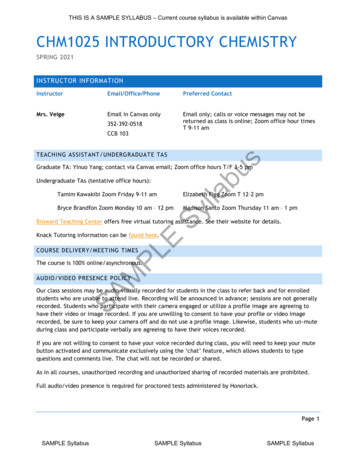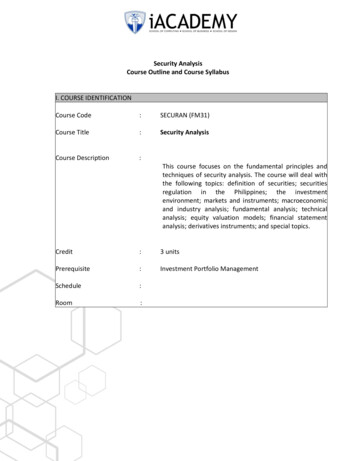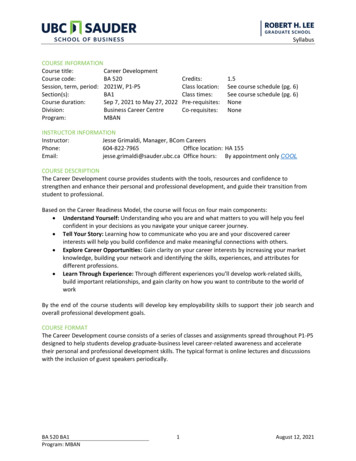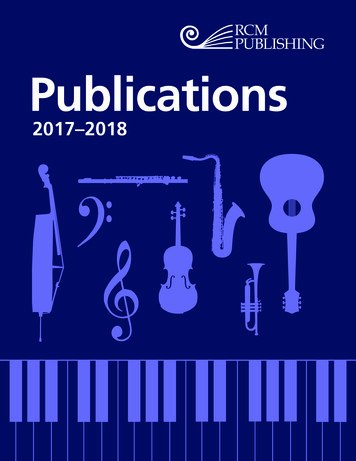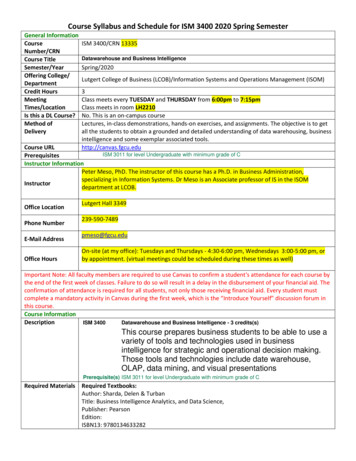
Transcription
Course Syllabus and Schedule for ISM 3400 2020 Spring SemesterGeneral InformationCourseNumber/CRNCourse TitleSemester/YearOffering College/DepartmentCredit HoursMeetingTimes/LocationIs this a DL Course?Method ofDeliveryISM 3400/CRN 13335Datawarehouse and Business IntelligenceSpring/2020Lutgert College of Business (LCOB)/Information Systems and Operations Management (ISOM)3Class meets every TUESDAY and THURSDAY from 6:00pm to 7:15pmClass meets in room LH2210No. This is an on-campus courseLectures, in-class demonstrations, hands-on exercises, and assignments. The objective is to getall the students to obtain a grounded and detailed understanding of data warehousing, businessintelligence and some exemplar associated tools.http://canvas.fgcu.eduCourse URLISM 3011 for level Undergraduate with minimum grade of CPrerequisitesInstructor InformationPeter Meso, PhD. The instructor of this course has a Ph.D. in Business Administration,specializing in Information Systems. Dr Meso is an Associate professor of IS in the ISOMInstructordepartment at LCOB.Office LocationPhone NumberE-Mail AddressOffice HoursLutgert Hall 3349239-590-7489pmeso@fgcu.eduOn-site (at my office): Tuesdays and Thursdays - 4:30-6:00 pm, Wednesdays 3:00-5:00 pm, orby appointment. (virtual meetings could be scheduled during these times as well)Important Note: All faculty members are required to use Canvas to confirm a student's attendance for each course bythe end of the first week of classes. Failure to do so will result in a delay in the disbursement of your financial aid. Theconfirmation of attendance is required for all students, not only those receiving financial aid. Every student mustcomplete a mandatory activity in Canvas during the first week, which is the “Introduce Yourself” discussion forum inthis course.Course InformationDescriptionISM 3400Datawarehouse and Business Intelligence - 3 credits(s)This course prepares business students to be able to use avariety of tools and technologies used in businessintelligence for strategic and operational decision making.Those tools and technologies include date warehouse,OLAP, data mining, and visual presentationsPrerequisite(s) ISM 3011 for level Undergraduate with minimum grade of CRequired MaterialsRequired Textbooks:Author: Sharda, Delen & TurbanTitle: Business Intelligence Analytics, and Data Science,Publisher: PearsonEdition:ISBN13: 9780134633282
Attendance PolicyGrading PolicyRequired Software:1. RapidMiner Studio (EDUCATIONAL PROGRAM EDITION). Available fromhttps://rapidminer.com/educational-program/. This is Free for students when youcreate your account using your FGCU email credentials.2. Microsoft SQL Server (Minimum requirement is Express Edition) Available at FGCU VLAB(http://aets.fgcu.edu/vlab.asp). a. Microsoft SQL Server (Minimum requirement isExpress Edition) is also available ati. FGCU Microsoft DreamSpark website. This is orVersionList.aspx?ws 3646cc65-bf9b-e011-969d-0030487d8897&vsro 8&JSEnabled 1 (We will send you alogin info during the 2nd week of the semester). This is free.ii. SQL Server Express and SQL Server Management Studio Express edition areavailable at the Microsoft website for free.3. SAS software for visual analytics (web-based access to this will be provided by theDepartment. Instructor will provide you with the access details in class).4. Microsoft Visio 2016, which is available through FGCU Microsoft DreamSpark MajorVersionList.aspx?ws 3646cc65bf9be011-969d-0030487d8897&vsro 8&JSEnabled 1). This is free.5. VMWare Horizon Client to access FGCU Virtual Lab. This is free.http://aets.fgcu.edu/vlab.asp.6. Microsoft Office (especially Word and Excel), which is available through FGCU MicrosoftDreamSpark MajorVersionList.aspx?ws 3646cc65bf9be011-969d-0030487d8897&vsro 8&JSEnabled 1). This is free.7. CANVAS, the learning management system used at FGCU. All students have a CANVASaccount.Recommended personal IT resources:A personal computer, a Web Browser and a reliable Internet Connection (for those thatchoose to access the course resources while off campus). If you do not have internet accessat home (or do not have a personal computer), you can access the course technology at oneof the community FCGU computing labs. NOTE: some of the course software will/may notoperate effectively on a MAC platform.Attendance is strongly suggested but is NOT part of the course grade.Graded Learning Activities/Assignments in this course are:- Exam 1 : . . 15 points- Exam 2 : . 15 points- Best 5 of 6 Individual Homework Assignments (6 points each): . . 30 points- labs & discussions: . . 40 pointsNOTE: Some exams may have multiple parts: e.g. a conceptual knowledge (concepts andterminology) part; a hands-on (modeling or development) part; and a Tools usage oradministration part.Grading Policy:A: 90 points or aboveB : Less than 90 points – 87 pointsB: Less than 87 points – 80 pointsC : Less than 80 points – 77 pointsC: Less than 77 points – 70 pointsD : Less than 70 points – 67 pointsD: Less than 67 points – 60 pointsF: Less than 60 points
No extra credit or additional assignments:Please be aware that FINAL GRADES FOR THIS COURSE ARE FINAL. No extra credit or additionalassignments are available at the end of the course.Grading and Feedback: The instructor will try to grade assignments and provide feedbackwithin one week although it is not guaranteed. - Detailed grading criteria for homeworkassignments will be specified in each assignment’s detailed instructions (usually as a rubric).Turnitin.com:Students who take this class must prepare electronic copies of most or all assignments. Some ofthem will be assessed via Turnitin.com for the detection of plagiarism. The University expectsthat all students will be evaluated and graded on their own work. If you use language, data orideas from other sources, published or unpublished, you must take care to acknowledge andproperly cite those sources. Failure to do so constitutes plagiarism. Papers that are submitted toTurnitin.com become part of the Turnitin.com student paper database solely for the purpose ofdetecting plagiarism.Policy regardingmissed exams andassignmentcompletiondeadlinesStatement on e‐mail usage in EagleMail and CANVASemailLast Day towithdrawDisclaimer“Credit hour” statement (developed by the LCOB):For each credit of a class, you should expect to spend one hour in class and an average of 2hours preparing outside of class each week. Therefore, since this is a 3-credit class, you shouldplan to devote an average of nine hours a week to this class. Although, depending on yourbackground and study habits, you may not need to spend this many hours, NOTE that you maynot be able to finish homework assignments in 1 hour. Therefore plan to begin work on yourhomework assignments at least several days before the designated due dates. Per policy, no make-ups for missed exams are administered (except for authorized andexcused absences specified in the university catalog). A student who seeks an authorized orexcused absence must submit documentation (such as a physician’s note) to the instructorin a timely manner. See the university catalog for more information. No late assignments will be accepted for any reasons except the authorized and excusedabsences specified in the university catalog. A student who seeks an authorized or excusedabsence must submit documentation (such as a physician’s note) to the instructor in atimely manner. See the university catalog for more information. Unfortunately, "dropped by the University for not paying the full tuition" is not anauthorized and excused absence as specified in the university catalog. An emergency situation such as unavailability of or inaccessibility to CANVAS due tonetwork problems will be considered by the instructor on a case by case basis. Studentsmust submit documentation (such as a screenshot of error messages) to the instructor in atimely manner.In addition to CANVAS and software applications listed earlier, we will use FGCU Eagle Mail asanother communication method. Students are expected to check Canvas mail and Eagle Mail ona daily basis.Be aware that Friday, March 27 is the last day to withdraw from class without academicpenalty.Assignments, schedules & due dates, instructions, and other course information presented inCanvas are integral components of the course material and are hereby incorporated as part ofthis syllabus.The instructor reserves the right to change, modify, alter, or transform any part of this syllabus,provided only that notice thereof is given to or at any party or parties that are thereby affected,subject to the rules and regulations of Florida Gulf Coast University.University StatementsAcademic Behavior Standards and Academic Dishonesty
All students are expected to demonstrate honesty in their academic pursuits. The university policies regarding issuesof honesty can be found in the FGCU Student Guidebook under the Student Code of Conduct and Policies andProcedures sections. All students are expected to study this document which outlines their responsibilities andconsequences for violations of the policy. The FGCU Student Guidebook is available online new.html.Sanctions for academic dishonesty may include receiving an “F” in this course – FGCU may impose additionalpenalties.Any incidents of academic dishonesty may be referred to the FGCU Office of Judicial Affairs. Please look up thedefinition of plagiarism – it includes copying something off the Internet & submitting it as your own work.Some examples of what is not acceptable: Working with another student & turning in the same work (e.g. spreadsheet, database, etc.) Emailing or posting your work to let someone else “just see how you did it”. Copying someone’s assignment or copying something from a book or the Internet. Giving or receiving help from someone (in person, online or on the phone) during an online test. Telling someone else what is on a test.Examples of what is acceptable: Discussing how to approach an assignment with another student.Showing someone where they might have made a mistake on an assignment.Asking the professor for help.University Nondiscrimination StatementFlorida Gulf Coast University is committed to ensuring equity and fairness for all University employees, students,visitors, vendors, contractors and other third parties. As such, the University prohibits discrimination on the bases ofrace, color, national origin, ethnicity, religion, age, disability, sex (including sexual harassment/assault), genderidentity/expression, marital status, sexual orientation, veteran status or genetic predisposition with regard toadmissions, employment, programs or other activities operated by the University. This prohibition extends toenforcement of Title IX of the Education Amendments of 1972. Questions or complaints should be directed to theOffice of Institutional Equity and Compliance (OIEC). The OIEC’s phone number is (239)745-4366; the OIEC emailaddress is OIEC@fgcu.edu.Disability Accommodations ServicesFlorida Gulf Coast University, in accordance with the Americans with Disabilities Act and the university’s guidingprinciples, will provide classroom and academic accommodations to students with documented disabilities. If youneed to request an accommodation in this class due to a disability, or you suspect that your academic performance isaffected by a disability, please see me or contact the Office of Adaptive Services. The Office of Adaptive Services islocated in the Wellness Building. The phone number is 239-590-7956 or Video Phone (VP) 239-243-9453. In additionto classroom and campus accommodations, individuals with disabilities are encouraged to create their personalemergency evacuation plan and FGCU is committed to providing information on emergency notification procedures.You can find information on the emergency exits and Areas of Rescue Assistance for each building, as well as otheremergency preparedness materials on the Environmental Health and Safety and University Police Departmentwebsites. If you will need assistance in the event of an emergency due to a disability, please contact Adaptive Servicesfor available services and information.Counseling ServicesCounseling and Psychological Services (CAPS) provides free counseling and therapy services (including psychiatry) toall FGCU students. Please walk in to the second floor Howard Hall office any week day between 8:30 and 4:30 toschedule an initial contact appointment. Visit the CAPS website at www.fgcu.edu/caps for more information. CAPSoffers a 24/7 Helpline at (239) 745-3277 (EARS).
Student Observance of Religious HolidaysAll students at Florida Gulf Coast University have a right to expect that the University will reasonably accommodatetheir religious observances, practices, and beliefs. Students, upon prior notification to their instructors, shall beexcused from class or other scheduled academic activity to observe a religious holy day of their faith. Students shallbe permitted a reasonable amount of time to make up the material or activities covered in their absence. Studentsshall not be penalized due to absence from class or other scheduled academic activity because of religiousobservances. Where practicable, major examinations, major assignments, and University ceremonies will not bescheduled on a major religious holy day. A student who is to be excused from class for a religious observance is notrequired to provide a second party certification of the reason for the absence.How To Log Into the Course in CANVAS If you have not already done so, activate your FGCU EagleMail Account. Your FGCU EagleMail account MUST beactivated to log in to CANVAS. If you are a first-time student, you will need your PIN and Eagle ID, both of whichare assigned at registration.o If you don’t know your PIN, you will need to go to the Registrar's Office to retrieve it.o To activate your account, visit t.jsp?mode activate. Log in to CANVAS at http://canvas.fgcu.edu. You need to use FGCU EagleMail account and password to log in.o Click “Courses”.o Select ISM 3400OutcomeNumber123456789101112Student Learning OutcomesEvaluation & Assessment MethodsRecognize differences between transactional data andanalytical dataDesign a Data warehouse via dimensional modelingTransform a conceptual dimension model into a relationaldata warehouse modelRecognize quality attributes of business intelligence dataMultiple choice questions of examsAnalyze ill-designed or unstructured / raw data and useformal methods to clean, transform and load the data intoa Data Warehouse of Business Intelligence RepositoryRecognize roles of business Intelligence and datawarehousing in an organizationRecognize the benefits and costs of business IntelligenceRecognize how to construct feasible and value-generatingbusiness intelligence questionsUse common or leading BI tools and algorithms to analyzedata, run BI queries and draw insightful inferencesUse common BI tools to develop business intelligencequeries to support individual or group-based decisionmakingUse Productivity tools to develop high-quality writtenand/or oral business intelligence reportsImplement a business intelligence or data warehousesolutionHomework assignments, ProjectHomework assignments, Project and Multiple choicequestions of examsHomework assignment and Multiple choice questionsof examsHomework assignments, ProjectMultiple choice questions of examsMultiple choice questions of examsHomework assignments, and ProjectHomework assignments, Project and Multiple choicequestions and Problem solving questions of examsHomework assignments, Project and Multiple choicequestions and Problem solving questions of examsHomework assignments, and ProjectHomework assignments, and ProjectISM 3400 Tentative Schedule (Subject to Change)Note: Homework assignments, Exams and Project are dueMonday at 2:00 PM EST (except Final exam which will be dueon a Friday).Weeks/DatesTopicsGraded Assignments Due
Wk1 (Jan 6-11)Syllabus, Course IntroductionMandatory assignment – Discussion Forum: Introduce YourselfDue Jan 10 (Fri)Ch 1 of ShardaLab 1: Introduction to RapidMinerWk2 (Jan 13-18)Ch 2 of Sharda: Data and Data Preparation. BasicAnalyticsLab 2: Data PreparationWk3 (Jan 20-25)Wk4 (Jan 27-Feb 1)Wk6 (Feb 10-15)Wk7 (Feb 17-22)Wk8 (Feb 24-Feb 29)Lab 2Ch 2 of Sharda: Descriptive Analytics (DescriptiveStatistics)HW 1: Basic Data prep; and analysis Due Monday Jan 20, 2:00PMLab 3: Descriptive StatisticsLab 3Ch 2 of Sharda: Descriptive Analytics (InferentialStatistics)Lab 4: Inferential StatisticsWk5 (Feb 3-8)Lab 1Lab 4Ch 2 of Sharda: Descriptive Analytics (Data Visualization& Business Reporting)Lab 5: Data VisualizationLab 5Chapter 3 of Sharda: Data WarehousesHW 2: Descriptive and Inferential Statistics & Data Visualization(Descriptive Analytics) Due Monday Feb 10, 2:00 PMLab 6: Dimension ModelingLab 6Chapter 3 of Sharda: Data WarehousesLab 7: Constructing a Data WarehouseLab 7Chapter 3 of Sharda: Data WarehousesHW 3: Dimension Modeling and Implementation of a DW DueMonday Feb 24, 2:00 PMLab 8: SQL & Querying Data Warehouse(Mar 2-7)SPRING BREAKSPRING BREAKWk9 (Mar 9-14)Ch 4 of Sharda: Predictive Analytics - QuantitativeExam 1 (Midterm Exam): Available Monday Feb 24, 2:00 PMDue Monday Mar 9, 2:00 PMWk10 (Mar 16-21)Ch 4 of Sharda: Predictive Analytics - QuantitativeWk11 (Mar 23-28)Lab 9: Predictive Analytics - QuantitativeLab 9Ch 5 of Sharda: Predictive Analytics – Text AnalyticsHW 5: Predictive Analytics - Quantitative Due Monday Mar 23,2:00 PMWk12 (Mar 30 - Apr 4) Ch 5 of Sharda: Predictive Analytics – Text AnalyticsLab 10: Predictive Analytics – Text MiningLab 10Wk13 (Apr 6-11)Ch 7 of Sharda: Big Data Concepts & ToolsHW 6: Predictive Analytics- Text Mining Due Monday Apr 6,2:00 PMWk14 (Apr 13-18)Ch 8 of ShardaWk15 (Apr 20-25)Ch 8 of ShardaWk16 (Apr 27- May 2) Exam 3 (Final) (All covered Chapters; All Homeworkassignments)Exam 2 (Final Exam): Available Friday Apr 24, 2:00 PM 6 DueFriday May 2, 2:00 PM
this course. Course Information Description ISM 3400 Datawarehouse and Business Intelligence - 3 credits(s) This course prepares business students to be able to use a variety of tools and technologies used in business intelligence for strategic and operational decision making. Those tools and technologies include date warehouse,


